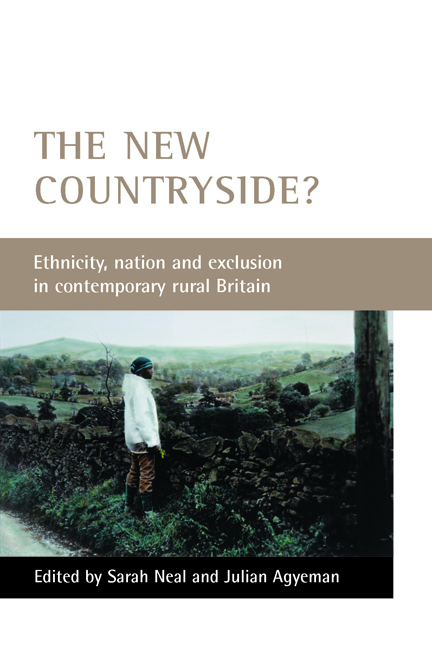five - Village People: race, class, nation and the community spirit
Published online by Cambridge University Press: 18 January 2022
Summary
Introduction
When I was 10 years old I moved with my family from an ethnically diverse suburb in East London to a small wholly white, predominantly middle-class village in Leicestershire. While growing up in Leicestershire, I travelled each day from my white village to ethnically diverse inner-city schools in Leicester. It is my experience of the spatialisation of race and place between the county and the city in Leicestershire that sowed the seeds of curiosity that led me to do the study discussed here. In this chapter, I draw upon anthropological fieldwork in a suburban Leicestershire ‘village’ to explore the ways in which the ‘village’ becomes a stage for the enactment and reproduction of white middle-class cultural homogeneity.
Rural studies scholars have begun to examine the ways in which the scripts and icons that comprise images of the English countryside are intertwined with specifically white middle-class values and lifestyles. After the Second World War, middle-class white city dwellers migrated in increasing numbers to the countryside, seeking a peaceful and respectable way of life, which they perceived to be ‘sanctioned by tradition and grounded in nature’ (Wright, 1999, p 19). Murdoch and Marsden (1991, p 47) note that by the 1990s, ‘the yearning for the rural corresponds in many ways to “Anglo-centricity”. Within this space identities are fixed within a white, family centred, increasingly middle-class domain.’
The rural has become depicted as a ‘white safe haven’, a crime-free zone and a ‘retreat’ away from what is perceived to be the ‘malaise’ in English cities often associated with Asian and black settlement (Neal, 2002, p 445; see also Kinsman, 1997). Agyeman and Spooner (1997) and Neal (2002) examine how white middle-class migrants and tourists to the countryside, politicians, the British heritage industry and popular television programmes have drawn upon generations of romantic and nationalist pastoral images to maintain the almost uniformly white constitution of rural England. These writers argue that such idealised images of rural England deny the history of Asians’, blacks’ and other settler minority peoples’ relationships with the English countryside and render ‘invisible’ the significant minority of ‘non-white’ residents who live in rural areas (Agyeman and Spooner, 1997, p 202; Neal, 2002, p 445).
- Type
- Chapter
- Information
- The New Countryside?Ethnicity, Nation and Exclusion in Contemporary Rural Britain, pp. 129 - 148Publisher: Bristol University PressPrint publication year: 2006



